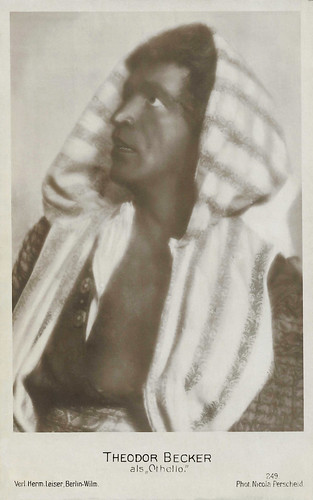
German postcard by Verlag Ross, Berlin, no. 278/4, 1919-1924. Photo: Alex Binder / Decla.

German postcard by Ross Verlag, Berlin, no. 666/6. Photo: Neumann. Theodor Becker as the Roman captain in the Biblical film I.N.R.I. / Crown of Thorns (Robert Wiene, 1923).

German postcard by Ross B.-V.-G., Berlin. Photo: Decla. Publicity still for the German historical drama Die Pest in Florenz / The Plague in Florence (Otto Rippert, 1919). Franziskus (Theodor Becker) in the catacombs.
A handsome man with striking facial features
Theodor Becker was born in 1880 in Mannheim, Germany. He became a successful stage actor who often appeared at theatres in Hannover and Berlin.
Becker was a handsome man with striking facial features and became very popular with his Hebbel interpretations. Besides his activity as an actor, he taught talented young actors, among them Wolfgang Völz. He also appeared in some silent films.
One of his first films was the silent drama Das wandernde Licht / The Wandering Light (Robert Wiene, 1916) starring Henny Porten, Bruno Decarli and Theodor Becker. It was based on a short story by Ernst von Wildenbruch in which a Count marries a woman who comes to wrongly believe that he is mad.
This was followed by memorable roles in such productions as Noemi, die blonde Jüdin / Noemi, That Blonde Jewish Woman (Hubert Moest, 1917) and Mouchy (Hubert Moest, 1918), both starring his then-wife, Hedda Vernon.
He then starred in the opulent and monumental late medieval morality play Pest in Florenz / The Plague in Florence (Otto Rippert, 1919), based on a screenplay by Fritz Lang. Becker played the hermit Francis, who succumbs to the charms of the courtesan Julia (Marga Kierska) and indulges in vice and the unrestrained decline of morals in Florence. At the end of the film, the plague breaks out in Florence and also kills the protagonists.

German postcard by Rotophot in the Film-Sterne series, no. 518/2. Photo: Eiko Film. Hedda Vernon and Theodor Becker in Mouschy / Mouchy (Hubert Moest, 1918).

German postcard by Verlag Hermann Leiser, Berlin-Wilm., no. 249. Photo: Nicola Perscheid. Theodor Becker as Othello. Collection: Geoffrey Donaldson Institute.

German postcard by Verlag Ross, Berlin, no. 278/2, 1919-1924. Photo: Alex Binder / Decla.
An early Karl May adaptation
Theodor Becker appeared with a small part in the early Karl May film Die Teufelsanbeter / The Devil Worshippers (1921), directed by the Turkish film pioneer Muhsin Ertuğrul (stage name ‘Salomon Bey’) and Marie Luise Droop, alongside Carl de Vogt as Kara Ben Nemsi. However, the film, which is considered lost today, was a financial failure.
During the 1920s, Theodor Becker appeared in such silent films as Jeremias / The Fall of Jerusalem (Eugen Illés, 1922), the Schiller drama Wilhelm Tell (Rudolf Walther-Fein, Rudolf Dworsky, 1923), and Ein Sommernachtstraum / A Midsummer Night's Dream (Hans Neumann, 1925), based on William Shakespeare's classic play. The latter film was believed to be lost, but nitrate fragments were found in the Deutsches Historisches Museum in the 1990s and may now be in the Bundesarchiv. Becker shone in this film as the Duke of Athens, Theseus, with Hans Albers playing the young Demetrius in love with Hermia (Charlotte Ander).
Becker also had a supporting part as a Roman commander in the religious epic I.N.R.I. / Crown of Thorns (Robert Wiene, 1923) starring Gregori Chmara, Henny Porten, and Asta Nielsen. The film is a retelling of the events leading up to the crucifixion of Jesus Christ.
He also appeared with Asta Nielsen and Gregori Chmara in Athleten / Athletes (Friedrich Zelnik, 1925). Becker's final film was the documentary story Das deutsche Lied / The German Song (Georg Germanus, Karl Pindl, 1928), set in the Middle Ages at the time of the minstrels. Becker then retired from the film business and worked exclusively in the theatre.
Becker was married to the actresses Maria Fein and Helma Seitz. His daughter Maria Becker, with Maria Fein, and his daughter Renate Becker, with Helma Seitz, became actresses too. Becker was a supporter of the National Socialists, and on the occasion of Adolf Hitler's 50th birthday, he was appointed state actor in 1939. Theodor Becker died in 1952 in Coppenbrügge, near Hanover, Lower Saxony, Germany. He was 72.

German postcard by Verlag Ross, Berlin, no. 278/3, 1919-1924. Photo: Alex Binder / Decla.

German postcard by Ross Verlag, unnumbered. Photo: Döring film company, Hannover, under guidance [Protektorat] of the Deutsche Sängerbund (DSB). Theodor Becker as Graf Otto von Meran (Otto, Count of Merania) and Frida Richard as Frau Hilde (mother of Walther von der Vogelweide) in the historical part of Das Deutsche Lied / The German Song (Karl Pindl, 1928). The film premiered in Vienna, Austria, at the 10th German Sängerbundesfest, 19-23 July 1928.

German postcard by Ross Verlag, unnumbered. Publicity still for the German silent film Das Deutsche Lied / The German Song (Karl Pindl, 1928), produced by the Döring film company, Hannover, on the instigation of the Deutscher Sängerbund (DSB), the largest German association of male choir singers. The film premiered in Vienna, Austria, at the 10th German Sängerbundesfest, 19-23 July 1928, while its first commercial premiere in Germany took place on 6 November 1928 at the Berlin Titania-Palast. It honoured the social status and historical significance of German songwriting. The film was scripted by Ferdinand Schneider and William Torge, while Karl Pindl directed the film. Sets were designed by Artur Günther, cinematography by Hugo Urban and August Lutz. Here, Theodor Becker as Graf Otto von Meran, in the historical part of the film.
Source: Stephanie D'heil (Steffi-Line), Wikipedia (German and English) and IMDb.
No comments:
Post a Comment